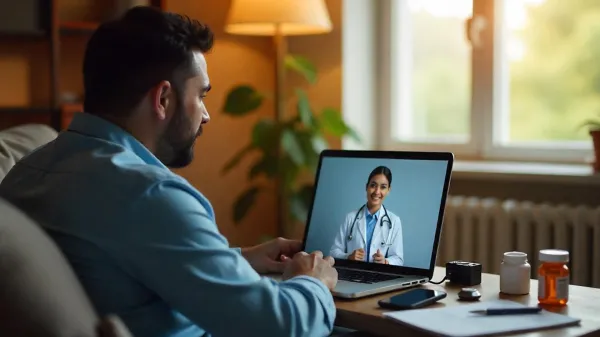Abridge Unveils AI-Powered Clinical Documentation Template for Pediatric Well Visits

Abridge's latest innovation leverages ambient AI and contextual reasoning to streamline and personalize pediatric care documentation.
Artificial intelligence clinical documentation startup Abridge has introduced a new medical record template specifically designed for pediatric primary care well visits.
The launch builds on the startup's mission to optimize clinical documentation using generative AI, ambient technology, and specialty-specific workflows.
This new template aims to support pediatricians by automatically detecting the nature of a child's medical visit and generating a structured, developmentally appropriate note—freeing up physicians to focus more on their young patients and their families.
Tailored for Pediatric Complexity
Pediatric well visits differ significantly across age groups, from infants to adolescents, and require a nuanced approach to documentation.
During these checkups, clinicians evaluate growth, development, nutrition, sleep, immunizations, sensory assessments, and mental health, all of which vary based on a child's age and developmental stage.
"The protocol for a 6-month-old's checkup is very different from that of a 15-year-old adolescent's annual physical," said Dr. Shiv Rao, CEO and co-founder of Abridge.
"Pediatric wellness visits have their own structure and their own way of integrating information back into the medical record."
Abridge's new solution is designed to recognize those distinctions. Using its proprietary contextual reasoning engine in combination with ambient AI technology, the tool listens to the clinician-patient interaction in real time, determines the nature of the visit, and auto-generates a tailored medical note.
The result is a highly structured and clinically relevant document customized for pediatric wellness care.
Recognizing Context & Structuring Notes
The AI-powered pediatric note template includes a specially formatted History of Present Illness (HPI) section. It also highlights "Well Visit" and "Anticipatory Guidance" as the main problems in the Assessment and Plan segment of the note.
"If we understand that this clinician is a pediatrician and the patient is under 18 years old, and we detect terms like developmental milestones or school performance, then we infer it's a wellness visit," explained Rao in a company video.
"In a wellness visit, there might be information related to diet, sleep, oral health, vision, hearing, birth history, or mental health. Our engine parses this in the background and structures it into appropriate sections before integrating it into the EHR."
This smart parsing ability is powered by natural language understanding models trained to identify medical concepts and segment them into appropriate documentation formats—enabling clinicians to complete notes with little to no manual input.
Developed with Pediatricians, For Pediatricians
Abridge developed the pediatric well-visit template in close collaboration with clinicians from its partner health systems.
The effort included direct input from two pediatricians on Abridge's internal team and extensive feedback from hundreds of pediatricians using the platform.
Dr. Joel Davidson, a pediatrician at Akron Children's Hospital, emphasized the emotional and clinical value of this new capability.
"Kids and families are very different, and there are little nuggets of information in these visits that are so important. The note feeling personal is one of the best parts of Abridge," Davidson said.
"It's transformed the way I communicate with families. Patients want me to focus on them, and this tool opens up that communication."
According to the startup, hundreds of clinicians across 24 health system partners tested and reviewed the new well-visit note type, giving it an average rating of 4.5 stars across hundreds of thousands of documented visits.
Expanding AI Use Across Specialties & Settings
The pediatric well-visit template is part of a broader push by Abridge to develop generative AI documentation tools tailored for specific medical specialties and clinical settings.
In January, the company released a similar solution for emergency care settings, which has since been deployed at major institutions such as Johns Hopkins Medicine, UChicago Medicine, Emory Healthcare, and Deaconess Health System.
Abridge's ambient AI solutions go beyond voice transcription. Its architecture links the clinical conversation with relevant context from prior visits, specialty-specific workflows, and billing codes—allowing it to create not only accurate but also billable documentation.
"What we're doing is going millions of miles deep in every single specialty and setting," Rao said. The technology is also being tested in collaboration with Mayo Clinic and EHR giant Epic to develop AI-powered documentation workflows for nurses.
Backed by Major Investment
The momentum behind Abridge reflects a broader boom in the AI scribe market. In February, the company secured $250 million in Series D funding at a reported valuation of $2.75 billion, bringing its total funding to more than $460 million.
According to recent reporting by The Information, Abridge is now in talks to raise "hundreds of millions" more at a $5 billion valuation.
Competitor Ambience Healthcare is reportedly also raising funds at a valuation of $1 billion, highlighting the intensifying race to lead the fast-growing sector.
As investor interest surges, the expectations for clinical AI companies are expanding. Abridge and its peers are moving beyond documentation into areas such as billing, medical coding, and revenue cycle management.
In a recent blog post, Abridge highlighted that its platform generates documentation that is not just clinically useful but also aligned with coding and billing requirements.
Stay tuned for more such updates on Digital Health News.
Stay tuned for more such updates on Digital Health News































